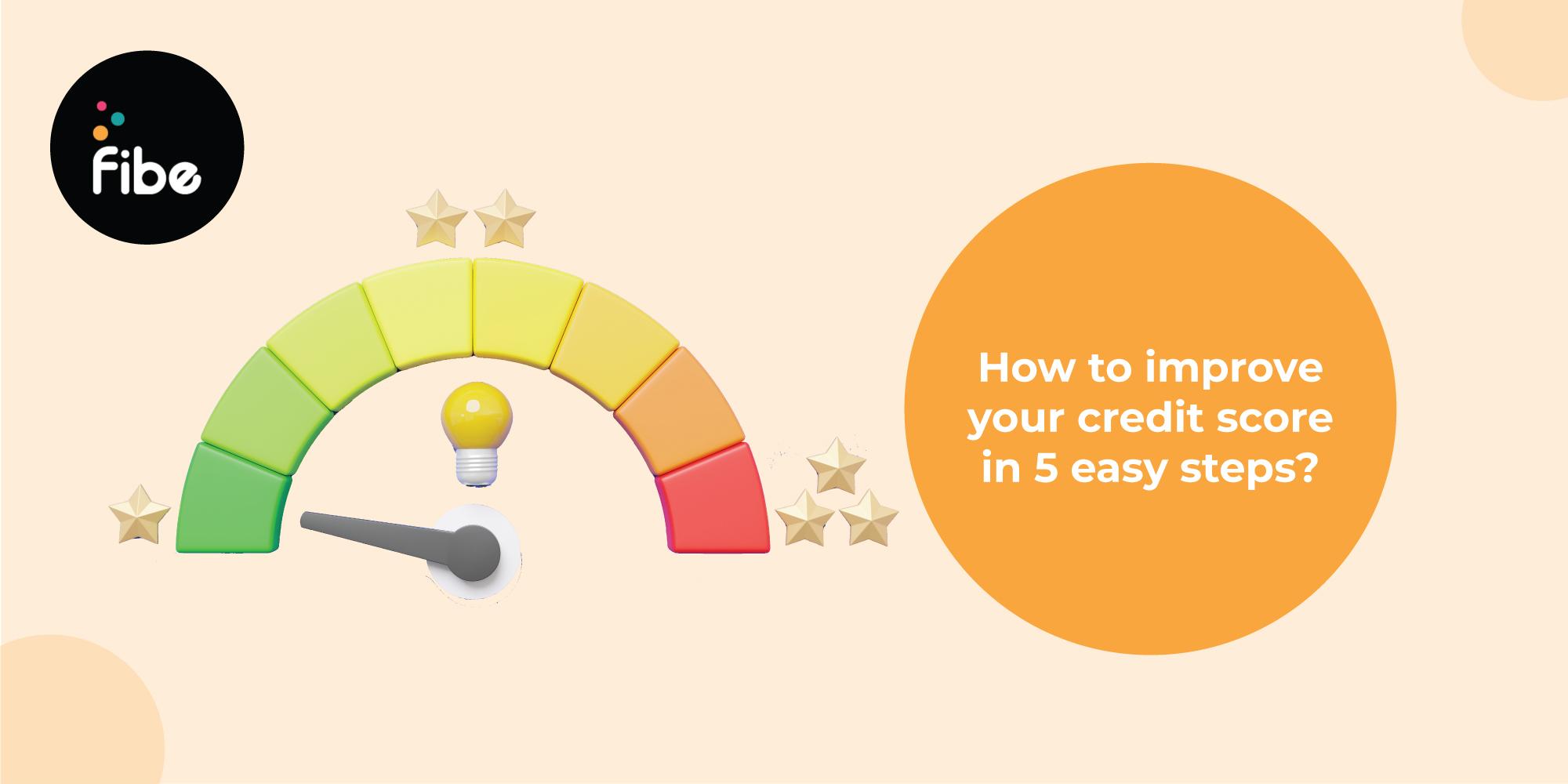Credit scores, commonly called CIBIL scores, [Credit Information Bureau (India) Limited] are a crucial parameter that lenders evaluate before approving personal loans and credit cards. As per the RBI’s mandate, all banks should check the CIBIL score of every loan/credit card applicant at the time of evaluation. A poor CIBIL score reflects poor credit management skills, and makes you an undesirable borrower.
Fibe understands that you should be in complete command of your finances. To help you with this goal, we have listed 5 simple steps to improve credit score:
- Timely credit payments: Slacking off on bill payments can lower your credit score. Missing deadlines may cause a significant drop as it indicates that you are not a responsible borrower. There is no quick fix to this, because credit scores reflect credit history, so a late payment could affect your report for years.
Pay bills, including but not limited to, credit card payments, rent, utilities and other bills on time for a hassle-free future lending experience. Another way is by limiting your card spending to 50% of the limit or conversely increasing your card spending limit. Spending more than 50% of your card limit signifies that you might not have enough to repay your debt obligations in future.
- Lower balances: Remember that you should spend only as much as you can repay within the billing date. Pay off your debts as soon as you can and keep card spending on the lower side. Another way to lower balances is by keeping the credit utilisation ratio up to 30% or less.
Lower balances – which include unpaid dues on loans and low or zero balances on credit cards can positively reflect on your credit score. This can also help you manage your finances better.
- Retain your old credit card account: You may have to switch to newer cards for various reasons. However, changing accounts isn’t the best of ideas. If you have a credit card account that is well managed, it is better to retain it for long as longevity of such an account can increase credit score. Good repayment history reflects your credibility as a lender.
- Report and resolve inaccuracies: If you discover any discrepancy in credit report, appeal for clarification if you have a valid proof to support your point. Disagreements and errors like typographical data entry errors or software errors can occur, so you’ll want to get them rectified at the earliest to avoid future trouble. The appeal for rectification must be addressed within a timeframe of one month (30 days) by the lender or financial agency/institution. Ideally, you should not apply for a fresh credit until old credit score disputes are resolved.
- Use a secured card: Credit score can increase by using a secured credit card which is offered by many Indian banks such as ICICI Bank, Citibank, SBI, Axis Bank etc. These cards are issued against a fixed deposit of a nominal amount. Timely balance payments can increase credit score. So if due to some circumstances you default on payments, your bank will immediately liquidate the FD against which you have received the card and the debt will be repaid. This option is ideal for those with low credit scores or those with no credit history. It can improve your credit story and gradually, increase your credit score.
Fibe Credit Score Analyser helps you to compare your credit score against Fibe’s best borrowers and understand where you stand. You can get to know the impact of your credit behaviour easily and tips on actions that can help you boost your score.
Head to the Fibe App today and begin your journey for better credit health!
FAQs on improving credit score
How can I raise my credit score in 30 days?
It takes at least 6 months to increase your credit score in general. While most lenders report repayment behaviour and other facts about your credit history to credit agencies every month, boosting your credit score can take longer.
What is the fastest way to improve credit?
The fastest ways to improve your credit score is by:
- Increasing the credit limit on your credit card and using up only 30% of it
- Correcting errors in your credit report
- Clearing existing debt
How can I boost my own credit score?
You can increase your credit score by paying your dues on time, decreasing your credit utilisation ratio, paying off existing loans in full, not applying for too many loans simultaneously and keeping your older credit card accounts active to increase the length of your credit history.
What are 3 things that will raise your credit score?
The 3 most important things to increase your credit score are making timely payments of EMIs and credit card bills, using less credit from available limits and showcasing experience with a mix of credit instruments.
Is there a way to update your credit score faster?
While there is no way to update credit score quickly, you can boost it by paying off any existing debt in one shot if your finances allow it. You can also get your credit card limit increased by talking to the issuer. This helps to decrease your credit utilisation ratio.
How to reset your credit score?
There is no way to reset your credit score as it is based on your credit history. However, you can increase it with tips like being diligent with repayment and paying credit card bills on time.
How can I get a 700 credit score in a month?
Improving your credit score in a month is usually impossible, but you can dispute inaccuracies in your credit report and clear your loans to boost it quickly. You can also pay off any existing credit card balance to increase your score quickly or get your limit extended.
